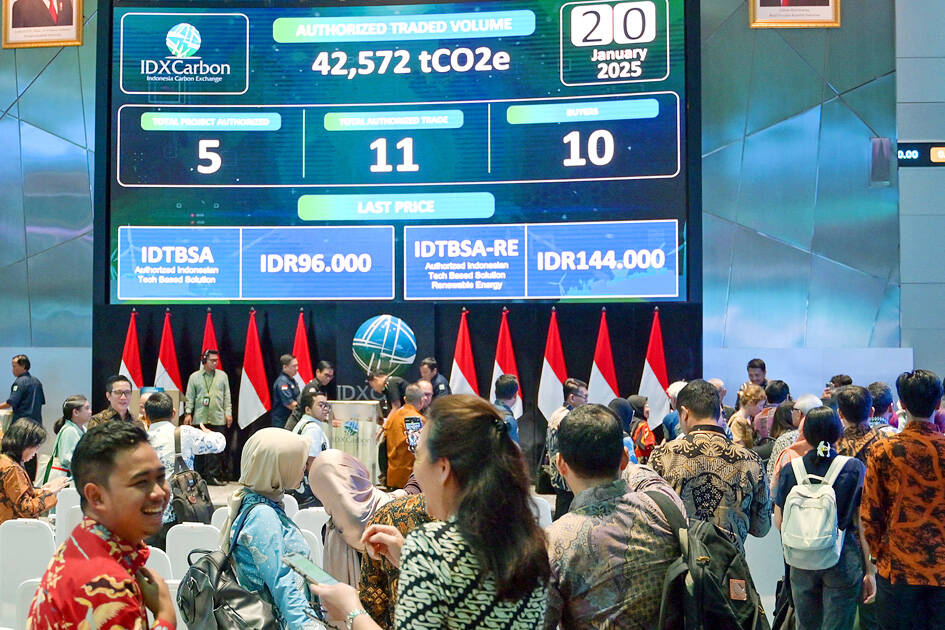Indonesia yesterday opened its carbon exchange to international buyers, aiming to raise funds to help meet ambitious domestic climate goals.
The move opens the way for foreign investors to enter a market launched in September 2023 for domestic players.
Carbon credits are generated by activities that avoid or reduce emissions of carbon dioxide — a potent greenhouse gas. They can be purchased by companies seeking to “offset” or cancel out some of their own emissions, either to comply with regulations or bolster their “green” credentials.

Photo: AFP
Indonesia is one of the world’s biggest polluters and is heavily reliant on coal to fuel its growing economy. It has made little progress on a multibillion-dollar investment plan agreed with the US and European nations in 2022 to wean its power grid off coal.
Indonesian President Prabowo Subianto last year brought forward the country’s timeline for carbon neutrality by a decade to 2050, and pledged to close hundreds of coal and fossil-fuel power plants by 2040.
The government says it wants to build more than 75 gigawatts of renewable energy capacity by 2040, but so far has laid out little detail on how it hopes to achieve that. It hopes that funds raised by carbon credits sales on the exchange would finance some of the green transition.
The launch is an “important milestone in our collective journey towards a sustainable future,” Minister of Environment Hanif Faisol Nurofiq said.
The move comes after new guidelines on country-level trade in carbon credits were agreed at COP29 last year. However, carbon credits have come under fire in recent years over revelations of shoddy accounting and even outright fraud in projects.
Hanif said the government would guarantee every credit issued on the exchange, with scrutiny to ensure emissions could not be double counted.
However, some experts expressed skepticism about the exchange, saying the domestic market had attracted relatively little interest.
“If domestic demand was high, we wouldn’t need to open it to foreign entities,” Institute for Essential Services Reform executive director Fabby Tumiwa said.
He said the domestic exchange had not been designed to align with Indonesia’s emissions reduction strategy and he had concerns about the “additionality” of projects on the market.
Carbon credit programs must show that emission reductions or avoidance would not have happened without the credits, and are “additional.”
This often requires trying to prove a counterfactual — what would have happened in the absence of the carbon credits — and has been a key problem for the sector.
Fabby warned it was not immediately clear if the credits available on the exchange were compatible with standards set by other countries.
Still, at least nine transactions took place at the start of yesterday’s trade, accounting for more than 41,000 tonnes of carbon dioxide equivalent, according to a board at the stock exchange.

MONEY GRAB: People were rushing to collect bills scattered on the ground after the plane transporting money crashed, which an official said hindered rescue efforts A cargo plane carrying money on Friday crashed near Bolivia’s capital, damaging about a dozen vehicles on highway, scattering bills on the ground and leaving at least 15 people dead and others injured, an official said. Bolivian Minister of Defense Marcelo Salinas said the Hercules C-130 plane was transporting newly printed Bolivian currency when it “landed and veered off the runway” at an airport in El Alto, a city adjacent to La Paz, before ending up in a nearby field. Firefighters managed to put out the flames that engulfed the aircraft. Fire chief Pavel Tovar said at least 15 people died, but

LIKE FATHER, LIKE DAUGHTER: By showing Ju-ae’s ability to handle a weapon, the photos ‘suggest she is indeed receiving training as a successor,’ an academic said North Korea on Saturday released a rare image of leader Kim Jong-un’s teenage daughter firing a rifle at a shooting range, adding to speculation that she is being groomed as his successor. Kim’s daughter, Ju-ae, has long been seen as the next in line to rule the secretive, nuclear-armed state, and took part in a string of recent high-profile outings, including last week’s military parade marking the closing stages of North Korea’s key party congress. Pyongyang’s official Korean Central News Agency (KCNA) released a photo of Ju-ae shooting a rifle at an outdoor shooting range, peering through a rifle scope

South Korea would soon no longer be one of the few countries where Google Maps does not work properly, after its security-conscious government reversed a two-decade stance to approve the export of high-precision map data to overseas servers. The approval was made “on the condition that strict security requirements are met,” the South Korean Ministry of Land, Infrastructure and Transport said. Those conditions include blurring military and other sensitive security-related facilities, as well as restricting longitude and latitude coordinates for South Korean territory on products such as Google Maps and Google Earth, it said. The decision is expected to hurt Naver and Kakao

Gaza is rapidly running out of its limited fuel supply and stocks of food staples might become tight, officials said, after Israel blocked the entry of fuel and goods into the war-shattered territory, citing fighting with Iran. The Israeli military closed all Gaza border crossings on Saturday after announcing airstrikes on Iran carried out jointly with the US. Israeli authorities late on Monday night said that they would reopen the Kerem Shalom crossing from Israel to Gaza yesterday, for “gradual entry of humanitarian aid” into the strip, without saying how much. Israeli authorities previously said the crossings could not be operated safely during